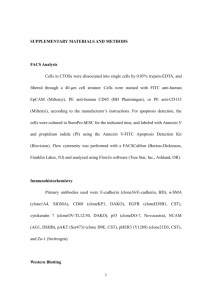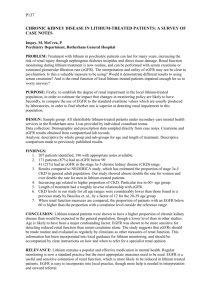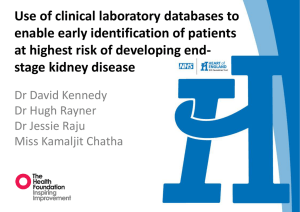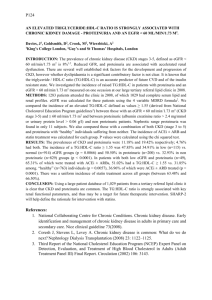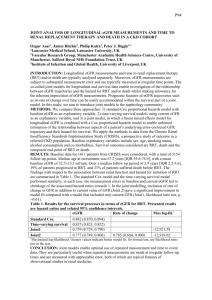DOCX ENG
advertisement
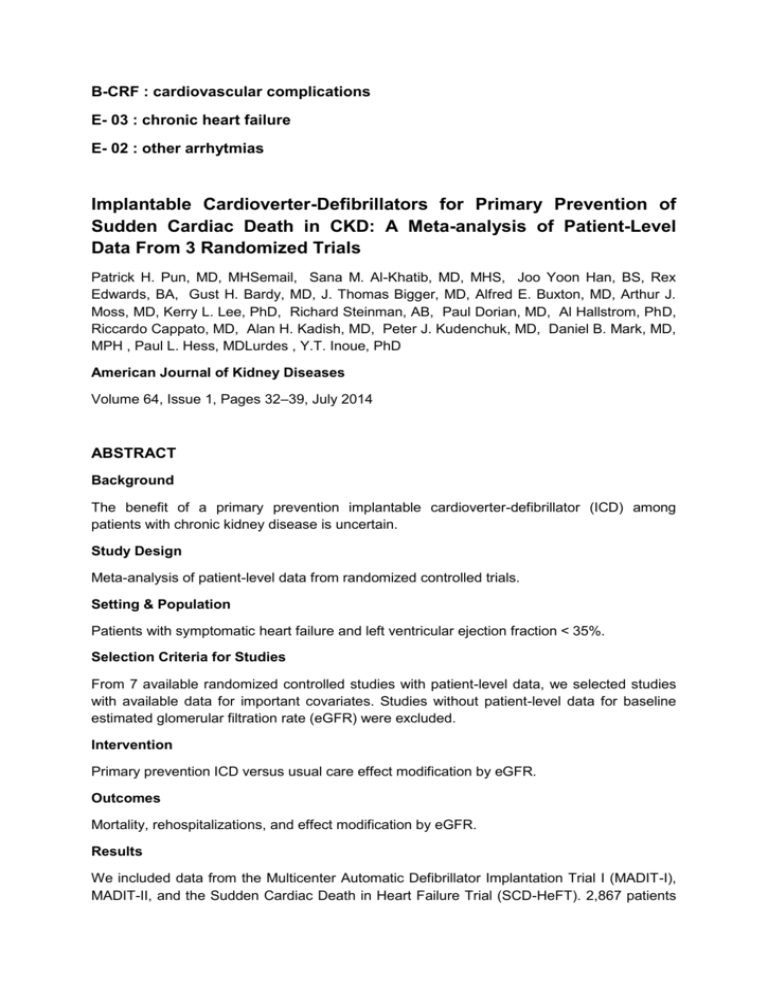
B-CRF : cardiovascular complications E- 03 : chronic heart failure E- 02 : other arrhytmias Implantable Cardioverter-Defibrillators for Primary Prevention of Sudden Cardiac Death in CKD: A Meta-analysis of Patient-Level Data From 3 Randomized Trials Patrick H. Pun, MD, MHSemail, Sana M. Al-Khatib, MD, MHS, Joo Yoon Han, BS, Rex Edwards, BA, Gust H. Bardy, MD, J. Thomas Bigger, MD, Alfred E. Buxton, MD, Arthur J. Moss, MD, Kerry L. Lee, PhD, Richard Steinman, AB, Paul Dorian, MD, Al Hallstrom, PhD, Riccardo Cappato, MD, Alan H. Kadish, MD, Peter J. Kudenchuk, MD, Daniel B. Mark, MD, MPH , Paul L. Hess, MDLurdes , Y.T. Inoue, PhD American Journal of Kidney Diseases Volume 64, Issue 1, Pages 32–39, July 2014 ABSTRACT Background The benefit of a primary prevention implantable cardioverter-defibrillator (ICD) among patients with chronic kidney disease is uncertain. Study Design Meta-analysis of patient-level data from randomized controlled trials. Setting & Population Patients with symptomatic heart failure and left ventricular ejection fraction < 35%. Selection Criteria for Studies From 7 available randomized controlled studies with patient-level data, we selected studies with available data for important covariates. Studies without patient-level data for baseline estimated glomerular filtration rate (eGFR) were excluded. Intervention Primary prevention ICD versus usual care effect modification by eGFR. Outcomes Mortality, rehospitalizations, and effect modification by eGFR. Results We included data from the Multicenter Automatic Defibrillator Implantation Trial I (MADIT-I), MADIT-II, and the Sudden Cardiac Death in Heart Failure Trial (SCD-HeFT). 2,867 patients were included; 36.3% had eGFR < 60 mL/min/1.73 m2. Kaplan-Meier estimate of the probability of death during follow-up was 43.3% for 1,334 patients receiving usual care and 35.8% for 1,533 ICD recipients. After adjustment for baseline differences, there was evidence that the survival benefit of ICDs in comparison to usual care depends on eGFR (posterior probability for null interaction P < 0.001). The ICD was associated with survival benefit for patients with eGFR≥60 mL/min/1.73 m2 (adjusted HR, 0.49; 95% posterior credible interval, 0.24-0.95), but not for patients with eGFR < 60 mL/min/1.73 m2 (adjusted HR, 0.80; 95% posterior credible interval, 0.40-1.53). eGFR did not modify the association between the ICD and rehospitalizations. Limitations Few patients with eGFR < 30 mL/min/1.73 m2 were available. Differences in trial-to-trial measurement techniques may lead to residual confounding. Conclusions Reductions in baseline eGFR decrease the survival benefit associated with the ICD. These findings should be confirmed by additional studies specifically targeting patients with varying eGFRs. Index Words: Implantable cardioverter-defibrillator (ICD), sudden cardiac death, chronic kidney disease (CKD), reduced ejection fraction, heart failure, meta-analysis COMMENTS Compared with the general population, patients with chronic renal failure have a 4- to 20fold greater risk of sudden cardiac death. Primary prevention implantable cardioverterdefibrillators (ICDs), used for patients who are at risk of but have not yet had life-threatening ventricular arrhythmias, have been proved to reduce sudden cardiac death and overall mortality among selected patients with reduced ejection fraction. However, the benefits and risks of this therapy for patients with CKD are not clear. A collaborative consortium involving the principal investigators of existing ICD trials was established to explore the effectiveness of ICDs in various subgroups. They conducted this pooled patient-level data analysis to assess whether kidney disease, as estimated by glomerular filtration rate (GFR), modifies the effect of ICD treatment on mortality and rehospitalizations compared to usual care Kidney function was determined by calculating estimated GFR (eGFR) at study enrollment. They used the CKD-EPI (CKD Epidemiology Collaboration) creatinine equation, which uses age, race, and sex in addition to serum creatinine concentration to determine eGFR and has been validated across populations with a wide range of GFRs. ( Levey, A.S. and Stevens, L.A. Estimating GFR using the CKD Epidemiology Collaboration (CKD-EPI) creatinine equation: more accurate GFR estimates, lower CKD prevalence estimates, and better risk predictions. Am J Kidney Dis. 2010; 55: 622–627) For consistency with prior literature and for simplicity, they dichotomized the cohort into 2 strata of eGFR: eGFR < 60 (CKD stages 35) and eGFR≥60 mL/min1.73 m2. They also examined outcomes by finer categories of eGFR (eGFR < 45, 45-59, 60-89, and ≥90 mL/min/1.73 m2) This meta-analysis of 2,867 patients enrolled in primary prevention ICD trials is the largest collection of prospective data for the risks and benefits of a primary prevention ICD in patients with CKD and the first meta-analysis to compare ICD outcomes against usual care in this patient population. In summary, they found that the mortality reduction associated with the ICD compared to control treatment is impacted significantly by baseline kidney function, with decreasing benefit as eGFR declines. As a group, patients with eGFR < 60 mL/min/1.73 m2 had a higher risk of rehospitalization, but the authors did not observe a significant interaction between level of kidney function (as measured by eGFR) and risk of rehospitalizations. There was no significant difference in the risk of ICD-related complications according to eGFR group This study provides evidence that the severity of CKD proportionally attenuates the benefit of the ICD. Such a message must be addressed to cardiologists. Pr. Jacques CHANARD Professor of Nephrology
